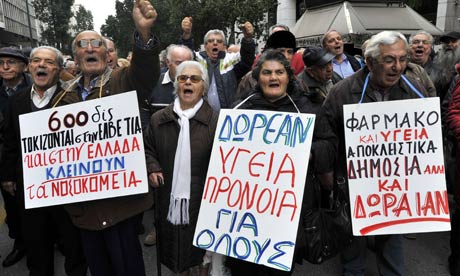Ian Traynor in Brussels and Helena Smith in Athens
The Guardian, Wednesday 15 February 2012
Bailout package in doubt as Athens refuses to give eurozone creditors the guarantees they demand
Greek pensioners added their voice to the protests against the government’s austerity measures in Athens. Photograph: Louisa Gouliamaki/AFP
Fears that Greece is heading towards the eurozone's first sovereign debt default hardened when the country's EU creditors abruptly called off an emergency meeting that was supposed to agree a €130bn bailout.
Jean-Claude Juncker, the Luxembourg prime minister and head of the eurogroup, blamed Greece's political leaders for failing to deliver on pledges long demanded of them in return for a new bailout funds.
Eurozone finance ministers last week postponed a decision on the rescue amid spiralling mistrust between Athens and its eurozone creditors.
A tumultuous weekend of rioting and parliamentary clashes then followed as the Papademos government pushed through a hugely unpopular austerity package to try to secure the money.
Last week, Juncker called another snap meeting for which was seen as a deadline for a deal. But the meeting was cancelled. Finance ministers are instead to hold a conference call before gathering for a regular scheduled meeting next Monday.
Greece will become the first eurozone country to declare sovereign default next month unless the bailout is granted. But northern European patience with the Greek government is virtually exhausted.
Among policymakers, there is a mounting sense of resignation that Greece is unable to meet its side of the bargain to facilitate the bailout, as well as a growing confidence that the eurozone is now in a much stronger position to weather a Greek default than when the crisis erupted two years ago.
"We should have everything clear on paper," said the Dutch finance minister, Jan Kees de Jager. "We don't give an inch. We want everything, a complete package … If we don't have that clear, we cannot agree with the package."
Meeting against a background of rioting in Athens on Sunday, the Greek parliament agreed to the eurozone's terms for the bailout, which would take the rescue funds to €240bn in two years.
But European exasperation has been fuelled by the consistent failure of Greek leaders to supply details on how a €325m funding gap is to be closed and by the same politicians, particularly the centre-right leader, Antonis Samaras, refusing to guarantee in writing that the deal cannot be revised following elections in April.
"I did not yet receive the required political assurances from the leaders of the Greek coalition parties on the implementation of the programme," said Juncker.
Levels of mistrust between Athens and the rest of the eurozone are at unprecedented levels. Weeks of brinkmanship have resulted in a hardening of positions on both sides, making a collapse of bailout plans quite conceivable.
Fears that the bailout was tantamount to an exercise in futility were fuelled by new data showing that the Greek economy had shrunk by 7% in the last quarter of 2011.
Juncker said he was still awaiting written undertakings from Greek party leaders on pushing through the austerity package of pay, pension and job cuts which parliament passed on Sunday as rioters torched dozens of buildings in central Athens.
Intensive talks are going on constantly behind the scenes across Europe over how and whether to save Greece. The crisis dominated a dinner outside Berlin on Monday evening for Scandinavian leaders hosted by Chancellor Angela Merkel of Germany. She is also to see the Italian prime minister, Mario Monti, on Friday.
Merkel is believed to be against allowing a Greek default but is encountering diminishing support both in Germany and elsewhere.
Under intense pressure to come up with the additional savings, Greece's prime minister, Lucas Papademos, had called a cabinet meeting to see how the €325m shortfall could be plugged.
"The clock is ticking and we have to meet this demand," said a Greek official. "We have a deadline on 20 March."
That is when Athens has to redeem €14.5bn of debt, impossible without a new bailout.
In a dramatic parliamentary vote on Sunday, Greece agreed to implement €3.3bn in cuts in return for further financial support from the EU, the European Central Bank and the International Monetary Fund. However, eurozone finance ministers, who had been set to endorse the deal last week, said Athens would still have to make more cuts after leaders backing Papademos's coalition government refused to cut pensions further.
Greece stumbles defiantly towards default | Business | The Guardian
![The [Greek] European Tragedy](https://blogger.googleusercontent.com/img/b/R29vZ2xl/AVvXsEiWKI5s90SFm1wWTk6bs4p7CgslaC2SnYPsrZhb-B-smOufNNCSxCvpBLI9hOB-LsXZjir_PNmEiMk2-E62F3xkg96IoC6QFAaZAnPRTVH340IN9WBRmWJqPkjWlgyRj3zpALp7h6hvA58/s920/GkBack_new.jpg)
